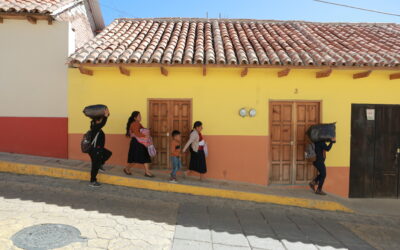Guatemala has the second highest rate of economic inequality in Latin America.
This is equivalent to authoritarian regimes in Asia or Africa.
Jorge Coy, Trickle Up Regional Representative:
Extreme poverty relates to the opportunities for, and conditions of, education and labor.
We generally talk about men, who are the head of the household and carry out the productive activities.
But we have found a number of families in which the head of the household is a woman.
When a woman is the head of household, she is much more vulnerable to poverty.
Only 41% of Guatemalan women are employed.
Ivan Juarez, Field Coordinator: A person living in extreme poverty is a person who cannot satisfy his or her most basic needs.
49% of children in Guatemala suffer chronic malnutrition.
Ivan Juarez: There is also political vulnerability within the community because they have been excluded. They do not participate in the Cocodes (Community Committees). They are not taken into account by community leadership.
And when they realize they are not taken into account, their self-esteem is diminished and they exclude themselves.
As such, when we arrive we use a system that allows us to reach the poorest.
Jorge Coy: Trickle Up’s mission seeks to leave no one behind.
We target poor women, heads of households, people with disabilities, Indigenous peoples that need an opportunity.
Self-esteem, from Trickle Up’s perspective, implies one’s self-worth, financial independence, but above all it means to be taken into account within the home, within the community, and to make important decisions.
We work through a model called the “Graduation Approach.” We try to build self-esteem through a training process. We ask the person to make a business plan with the help of the technical team. This business plan provides a strategy for how to invest their seed capital.
The seed capital is a one time grant and is not refundable. It is for the family, for the person, to be able to generate more resources.
Aurora Quix, Participant: They came and told me about the savings group. I didn’t really want to, but then I went.”
Then the time came for us to receive the money, and we started working with it. I decided to purchase clothes and sell them. That’s my business.
When I started, my husband didn’t want me to be involved. But we started to see the benefits and we were making money. He told me that it was good that I had participated. He told me that he was going to help me sell.
Ivan Juarez: Our most serious difficulties are in the communities where machismo and patriarchy play a large role.
Aurora Quix: We took care of the land for a man. He found out that I had a business and he would not allow me to have my things on his land. The neighbors complained to him, we felt betrayed. He told us to move out.
So my husband told me he would quit his job and that we would buy a piece of land where we would live.
Jorge Coy: If a woman who has participated two or three years in her savings group, then goes to a bank and asks for a loan to buy a computer for her daughter who is in junior high school and gets it, I think that is an achievement.
Miriam Tecj, Field Technician: Many communities did not believe in the program. What has motivated me is to seeing how the savings groups complete a cycle and everyone is happy with the benefits.
Jorge Coy: The most important thing is that people learn how to use their resources and to build up a business.
Aurora Quix: What I want is for my business to grow. I’m going to keep going!


